
In this Nearpod lesson on fractions, students will review fractions and learn how to identify and create equivalent fractions.
- Subject:
- Elementary Mathematics
- Mathematics
- Material Type:
- Nearpod
- Author:
- Nearpod
- Date Added:
- 08/02/2021

In this Nearpod lesson on fractions, students will review fractions and learn how to identify and create equivalent fractions.
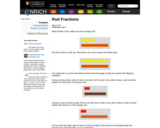
This problem allows students an opportunity to think about fraction comparisons and equivalencies in a different way using interactive rods. Students are given two different fraction rods of unknown lengths and the goal is to find out what fraction the shorter rod is of the longer rod. A Teacher's Notes page, hints, solution, and printable pages are provided.
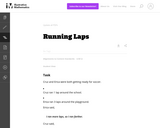
The purpose of this task is for students to compare two fractions that arise in a context. Because the fractions are equal, students need to be able to explain how they know that.
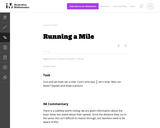
This word problem asks students to think about fractions.
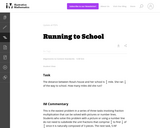
This task involves fraction multiplication and can be solved with pictures or number lines.
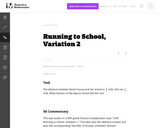
This task builds on a fifth grade fraction multiplication task, Ň5.NF Running to School, Variation 1.Ó This task uses the identical context, but asks the corresponding ŇNumber of Groups UnknownÓ division problem. See Ň6.NS Running to School, Variation 3Ó for the ŇGroup Size UnknownÓ version.

The purpose of this task is to have students add fractions with unlike denominators and divide a unit fraction by a whole number.
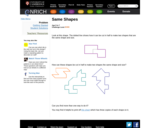
This problem challenges and extends students' spatial awareness with 2D shapes. The students are given three different irregular shapes. The goal is to divide each of them into two parts that are exactly the same shape and size. The Teachers' Notes page offers rationale, suggestions for implementation with a link to Happy Halving (cataloged seperately), discussion questions, and ideas for extension and support.

This three-act math task utilizes videos and questioning to help students explore working with quarters and wholes.
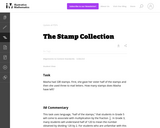
This task uses language, "half of the stamps," that students in Grade 5 will come to associate with multiplication by the fraction 12. In Grade 3, many students will understand half of 120 to mean the number obtained by dividing 120 by 2. For students who are unfamiliar with this language the task provides a preparation for the later understanding that a fraction of a quantity is that fraction times the quantity.

This interactive Flash game gives students practice in telling time on an analog clock while also developing strategic thinking. Students take turns advancing the clock by 1/4, 1/2, or 1 hour. The winner is the player who moves the hands of the clock to exactly midnight. This activity can merely familiarize students with the clock and time intervals, or it can challenge older students to find the strategy that always wins.
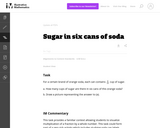
This task provides a familiar context allowing students to visualize multiplication of a fraction by a whole number. This task could form part of a very rich activity which includes studying soda can labels.
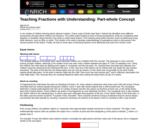
This four-page article describes four basic approaches children use in understanding fractions as equal parts of a whole. Topics covered include working with equal shares, partitioning regions and units, understanding of fraction equivalence, and ideas for teaching fractions more effectively. References are given.
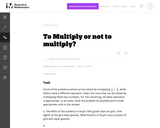
This series of word problems requires students to determine which problems can be solved by multiplying 1/8_2/5.

In this activity students interact with rotations of a two-dimensional image. It is intended to be a bridge between the physical turning of objects and the more abstract rotations of a 2-D image. Students are asked how many quarter turns it will take to achieve a resultant image. There is an interactive Java applet available for the manipulations. The Teachers' Notes page includes suggestions for implementation, discussion questions, ideas for extension, and printable sheets.
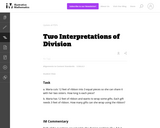
Both of the questions in this task are solved by the division problem 12Ö3 but what happens to the ribbon is different in each case.

In this article Pennant and Woodham discuss the importance of rich tasks in the teaching of fractions. In order to prepare for new more rigorous standards, the authors have compiled a list of rich tasks and a description of others that aim to improve how children think about fractions.
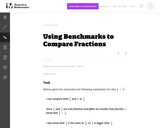
The goal of this task is to provide examples for comparing two fractions by finding a benchmark fraction which lies in between the two.
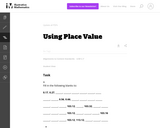
This task highlights a slightly different aspect of place value as it relates to decimal notation. More than simply being comfortable with decimal notation, the point is for students to be able to move fluidly between and among the different ways that a single value can be represented and to understand the relative size of the numbers in each place.

Utah Road Trip: Standard 7.RP.1 Compute unit rates associated with ratios of fractions, including ratios of lengths, areas and other quantities measured in like or different units. For example, if a person walks ½ mile in each ¼ hour, compute the unit rate as the complex fraction ½/¼ miles per hour, equivalently 2 miles per hour
This formative assessment exemplar was created by a team of Utah educators to be used as a resource in the classroom. It was reviewed for appropriateness by a Bias and Sensitivity/Special Education team and by state mathematics leaders. While no assessment is perfect, it is intended to be used as a formative tool that enables teachers to obtain evidence of student learning, identify assets and gaps in that learning, and adjust instruction for the two dimensions that are important for mathematical learning experiences (i.e., Standards for Mathematical Practice, Major Work of the Grade).